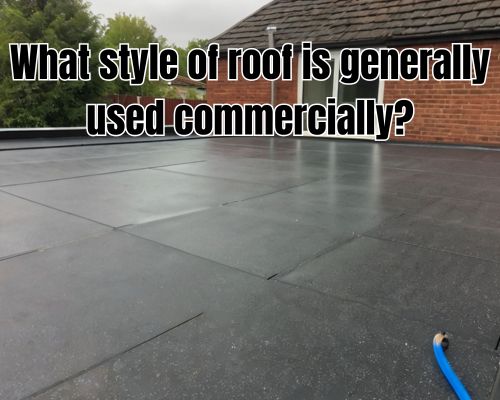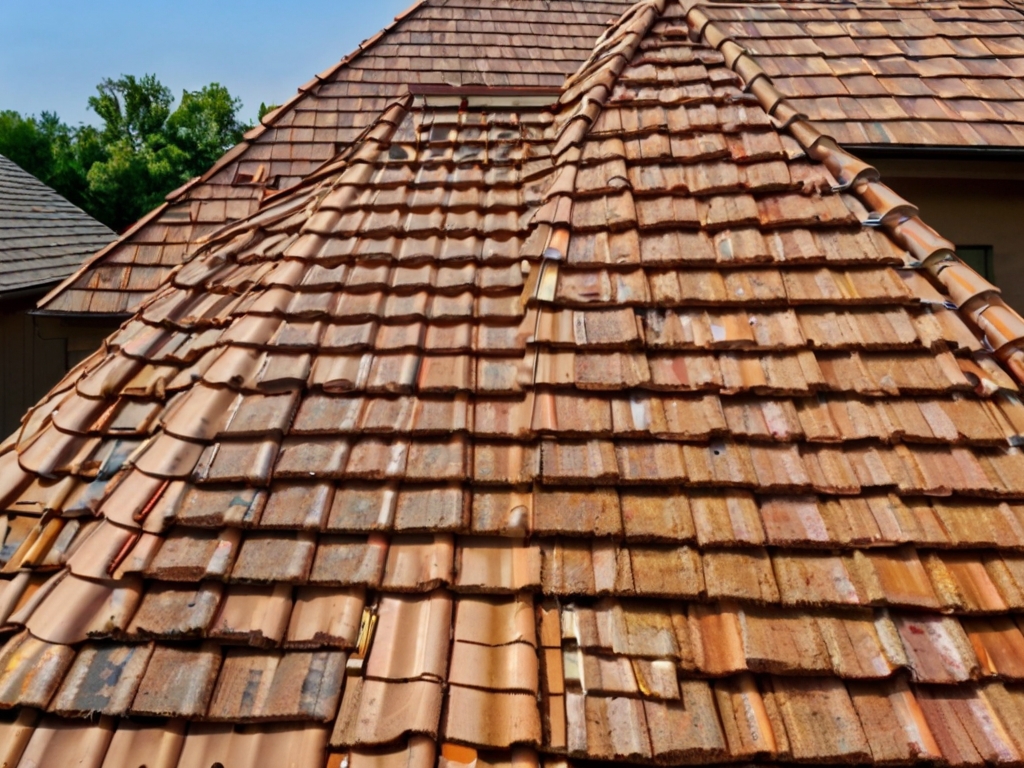What Style of Roof Is Generally Used Commercially? | New Jersey’s Commercial Roofing Insights

When it comes to commercial buildings, the choice of roofing style isn’t just a matter of aesthetics—it’s a crucial business decision. A roof must be cost-effective, energy-efficient, durable, and suited to the local climate. For property developers, business owners, and facility managers in New Jersey, understanding the most commonly used commercial roof styles can make the difference between long-term performance and costly repairs.

So, what style of roof is generally used commercially, especially across New Jersey’s diverse commercial landscape? With Charles Jimerson of CJ Commercial Roofing NJ, let’s explore the top contenders, their unique features, and why they dominate the industrial and commercial skyline of the Garden State.
🏢 Flat Roofs: The Ubiquitous Choice in Commercial Construction
The Industry Standard
Across New Jersey, from Newark to Trenton and out to the Jersey Shore, flat roofs remain the most prevalent commercial roofing style. Technically, they’re low-slope roofs (typically under a 10-degree pitch), but their “flat” profile offers maximum utility and cost-effectiveness.
Why Flat Roofs Reign Supreme
- Cost Efficiency: Flat roofs are significantly more affordable to construct compared to pitched alternatives due to reduced material use and simpler installation.
- Space Optimization: Businesses in urban centers like Jersey City and Hoboken often use flat roofs for HVAC systems, solar panels, or even rooftop patios.
- Ease of Maintenance: Accessibility is a major factor—technicians can easily inspect or repair flat roofs without specialized equipment.
🔍 Popular Commercial Roofing Systems on Flat Roofs
Different roofing systems are applied to flat roofs depending on budget, performance goals, and building requirements. Let’s look at the top systems in New Jersey’s commercial market:
1. Built-Up Roofing (BUR)
A time-tested classic, BUR systems are composed of alternating layers of bitumen (asphalt) and reinforcing fabrics. Topped with gravel, they offer great protection against New Jersey’s wet winters and humid summers.
- Salient Benefit: Excellent waterproofing and UV resistance.
- Best For: Warehouses, schools, and municipal buildings.
2. Modified Bitumen
Modified bitumen roofs are a modern evolution of BUR systems. With added polymers, they’re more flexible and resistant to cracking—an asset in New Jersey’s freeze-thaw cycles.
- Salient Benefit: Superior tensile strength.
- Best For: Strip malls, apartment complexes, and light industrial buildings.
3. TPO (Thermoplastic Polyolefin)
TPO roofing has surged in popularity across New Jersey due to its energy-efficient white membrane, which reflects UV rays and reduces cooling costs—particularly important in South Jersey’s hotter climate zones.
- Salient Benefit: Energy Star certified; environmentally friendly.
- Best For: Healthcare facilities, retail stores, and office buildings.
4. EPDM (Ethylene Propylene Diene Monomer)
This black synthetic rubber roofing material excels in cold climates and is extremely durable.
- Salient Benefit: Long lifespan (up to 30 years) and low cost.
- Best For: Large commercial structures, especially those in North Jersey’s colder counties like Sussex and Warren.
🏗️ Sloped Roofs in Commercial Settings: Where They Fit
Although flat roofs dominate, some commercial structures in New Jersey do feature sloped or pitched roofing—especially those blending into residential neighborhoods or in upscale suburbs like Princeton, Montclair, or Morristown.
Common Sloped Commercial Roofing Styles:
- Gable Roofs: Ideal for small offices and retail shops. The traditional A-frame look adds curb appeal.
- Hip Roofs: Common in restaurants and boutique hotels; they offer better wind resistance—handy in coastal areas like Atlantic City or Cape May.
- Mansard Roofs: Stylish and functional, these French-inspired designs are used in historic preservation areas.
These pitched styles often feature metal roofing, asphalt shingles, or architectural shingles—especially where zoning codes prioritize visual integration with nearby residential properties.
🛠️ Factors That Influence Roof Style Selection in New Jersey
1. Climate Considerations
- Snow Load: Northern New Jersey sees higher snowfall, so roofing systems must handle weight and offer superior insulation.
- Storm Resistance: Along the coast, hurricane-strength winds demand wind-resistant systems like single-ply membranes and fully adhered TPO.
2. Building Use
- A logistics warehouse in Edison has vastly different roofing needs compared to a luxury hotel in Hoboken.
- Roofing for medical facilities demands superior energy efficiency and chemical resistance.
- Retail centers often prioritize aesthetics, opting for faux-sloped facades over functional flat roofs.
3. Energy Efficiency
With rising utility costs and New Jersey’s push toward greener building standards, cool roof technologies like white TPO, green roofs, and solar-ready systems are seeing increased adoption.
🌆 Local Roofing Trends & Codes in New Jersey
Local Adoption Patterns
- North Jersey leans heavily into EPDM and BUR systems due to weather extremes.
- Central Jersey shows a balanced mix of TPO and modified bitumen due to fluctuating weather.
- South Jersey increasingly embraces TPO and solar-integrated membranes.
Compliance & Regulation
New Jersey enforces strict building codes via the NJ Department of Community Affairs, which impacts everything from fire ratings to insulation values (R-values). Commercial roofers must also comply with municipal zoning ordinances, which vary widely across counties like Bergen, Essex, Camden, and Monmouth.
🧠 Insights from Local Roofing Contractors
According to commercial roofing specialists in New Jersey, the most requested systems in 2025 include:
- TPO for energy-conscious clients
- EPDM for legacy buildings and retrofits
- Green roof retrofits in urban redevelopment projects
Additionally, sustainable roofing options are no longer niche—thanks in part to state incentives for energy-efficient construction under the New Jersey Clean Energy Program (NJCEP).
✅ Final Thoughts: Choosing the Right Commercial Roof Style
So, what style of roof is generally used commercially in New Jersey? Without a doubt, flat roofs dominate the landscape. However, the roofing system you choose—BUR, TPO, EPDM, or modified bitumen—matters just as much as the style. And for specialty commercial projects, sloped roofs have their place, particularly in aesthetically driven zones.
For business owners, property managers, and developers in New Jersey, partnering with a local commercial roofing expert ensures your roof not only meets structural and regulatory demands but also supports long-term performance and sustainability goals.
🔍 Local Roofing Companies in New Jersey to Consider:
- CJ Commercial Roofing NJ – Specializes in historic and flat commercial roofing.
- Allied Roofing Solutions (Hackensack) – Known for EPDM and TPO installations.
- RGB Construction (West Deptford) – Trusted in Southern NJ for commercial retrofits.
